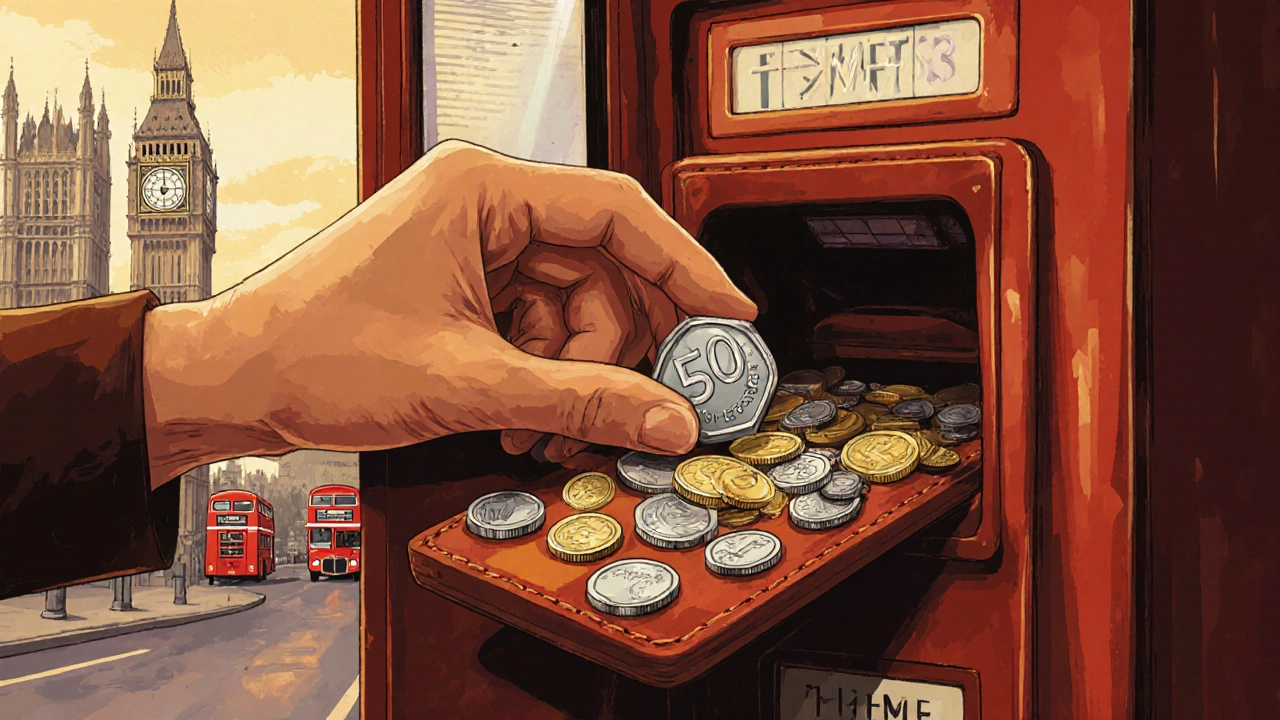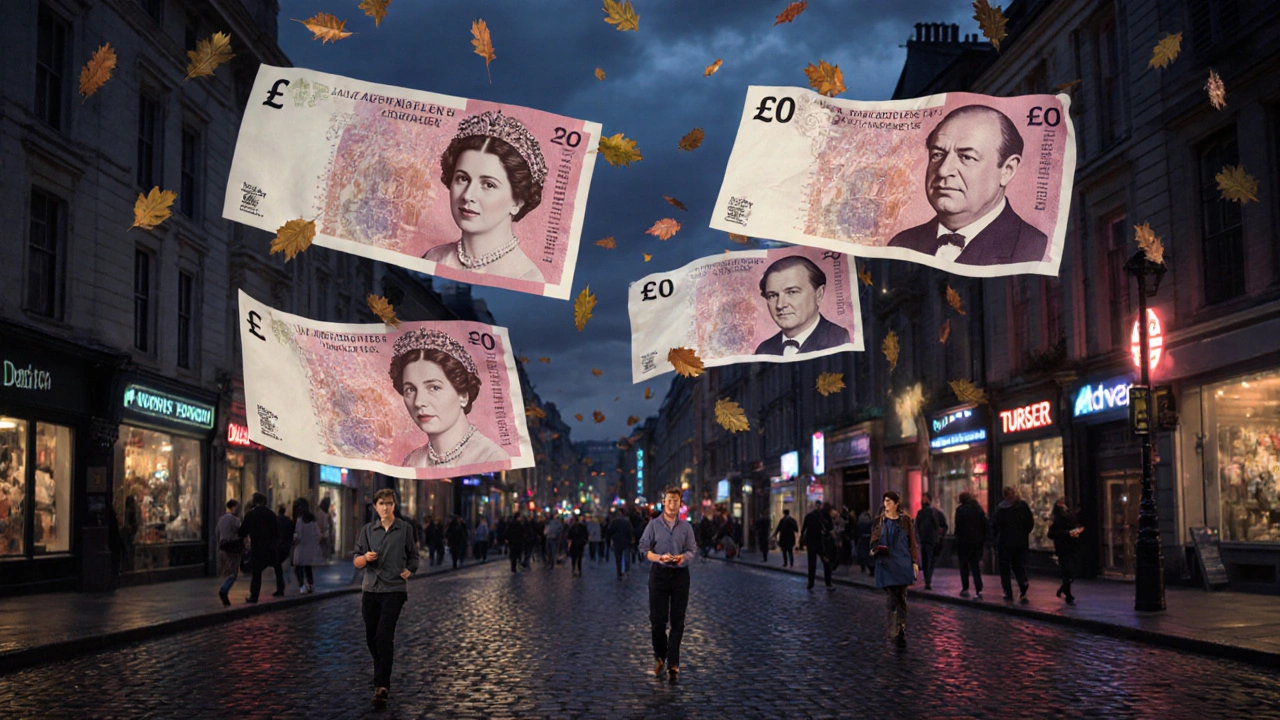If you're heading to London, you'll need to understand one thing before you even step off the tube: pounds are the only currency that works here. No euros, no dollars, no credit card magic if you're buying a pie from a market stall. Cash still matters-especially in smaller shops, pubs, and historic markets. And if you don’t know your £5 note from your £2 coin, you’ll end up confused, overpaying, or worse-getting ripped off.
Let’s cut through the noise. This isn’t about banking systems or exchange rates. It’s about what you need to know to move through London like a local-not a tourist who stares at their change like it’s a puzzle.
What British money actually looks like
The UK uses the pound sterling (GBP), symbolized by £. Banknotes come in £5, £10, £20, and £50 denominations. Coins are 1p, 2p, 5p, 10p, 20p, 50p, £1, and £2. That’s it. No £100 notes in regular circulation, and you won’t see any pennies older than 1971 unless you’re in a museum.
Here’s what you’ll actually hold in your hand:
- £5 note: Blue. Features Queen Elizabeth II (still on all current notes until new ones fully replace them).
- £10 note: Purple. Has Jane Austen on it-yes, the author, not a royal.
- £20 note: Yellow-green. Features Winston Churchill.
- £50 note: Reddish. Has Alan Turing, the computer science pioneer.
Coins are trickier because they’re all similar in size and color. The £1 coin is gold with a 12-sided shape-easy to spot. The £2 coin is bi-metallic: silver ring with a gold center. The 50p is the big, flat, seven-sided one. If you’ve ever fumbled for change in a vending machine, you know how easy it is to grab the wrong coin.
Where to get British pounds
Don’t waste time exchanging cash at the airport. Heathrow and Gatwick exchange counters charge terrible rates-sometimes 10% worse than your bank. Instead, use an ATM. Any major bank ATM in London (Barclays, HSBC, Lloyds) will give you pounds at a fair rate. Just make sure your card has no foreign transaction fees. Some U.S. banks like Charles Schwab reimburse ATM fees worldwide-perfect for travelers.
Pro tip: Always choose to be charged in pounds, not your home currency. That “no fee” option at the ATM? It’s a trap. The machine converts your money at a terrible rate. Let your bank handle it-they’ll give you a better deal.
If you need cash before you land, buy a small amount online from a reputable provider like Wise or Revolut. They offer near-real-time exchange rates and no hidden fees. You can even load a travel card with pounds and use it like a debit card in London.
Using cash vs. cards in London
London is one of the most card-friendly cities in the world. Contactless payments (tap-and-go) work everywhere-from the Tube to the corner shop. You can pay for a £3 coffee, a £12 sandwich, or even a £40 museum ticket without touching cash.
But here’s the catch: some places still only take cash.
- Street food vendors (especially in Borough Market or Camden)
- Pubs with no card machine (yes, they still exist)
- Small independent bookshops
- Public toilets (yes, some still charge 20p to 50p)
- Markets like Portobello Road or Spitalfields
So carry £20-£50 in cash. Not more. You don’t need to be a walking wallet. And never carry your entire budget in one pocket. Pickpockets are real in tourist hotspots like Leicester Square or around Big Ben.

Understanding coin values quickly
Most tourists get tripped up by coins because they’re not used to the sizes. Here’s a quick cheat sheet:
| Value | Color/Shape | Size (approx.) | What it buys |
|---|---|---|---|
| 1p | Copper | Small | One mint |
| 2p | Copper | Small | Half a chocolate bar |
| 5p | Silver | Small | One bus ticket (zone 1) |
| 10p | Silver | Medium | Small packet of crisps |
| 20p | Silver | Medium | One coffee (basic) |
| 50p | Silver | Large, seven-sided | One tube ride (zone 1-2) |
| £1 | Gold, 12-sided | Larger | One pint of beer |
| £2 | Gold center, silver ring | Largest | One sandwich or bus ticket (zone 1-3) |
Don’t memorize this. Just remember: the bigger the coin, the more it’s worth-except for the 50p. It’s big, but only worth half a pound. The £1 coin is smaller than the £2 but worth more. It’s weird, but you’ll get used to it after two days.
What you can’t do with British money
Some things tourists assume are true-but aren’t:
- You can’t use Scottish or Northern Irish notes everywhere. They’re legal tender in the UK, but many shops in London refuse them because they’re unfamiliar. Stick to Bank of England notes.
- Old £1 coins are no longer valid. The old round £1 coin was replaced in 2017. If you find one, it’s worthless. Banks won’t take it.
- Don’t expect change in pennies. Most places round to the nearest 5p. If your bill is £4.97, you’ll pay £5.00. It’s not a scam-it’s standard practice.
- UK doesn’t use cents. Everything is in pence (p) and pounds (£). 99p is “ninety-nine pence,” not “ninety-nine cents.”

How to avoid being overcharged
London has some sneaky pricing tricks. Here’s how to stay safe:
- Check the price before you order. A “£5 sandwich” at a tourist spot might be £12 if it’s near the London Eye. Always ask: “Is this the final price?”
- Watch for service charges. Some restaurants add 12.5% automatically. Check the bill. If it says “service included,” you don’t tip.
- Don’t use currency converters on your phone. They’re inaccurate. Use a real-time app like XE or Revolut to see the actual exchange rate.
- Don’t buy souvenir coins at gift shops. They’re sold as collectibles at 3-5x their face value. A £2 coin might cost you £10. It’s not a souvenir-it’s a rip-off.
What to do with leftover pounds
You’re leaving London with £17 in change? Don’t toss it.
- Use it on your last day: buy a snack, a postcard, or a tube ticket to the airport.
- Exchange it at a reputable bureau like Travelex in central London (not at the airport).
- Use a service like Revolut or Wise to convert leftover cash digitally before you fly.
- Leave it as a tip. A £1 coin on the table for a server? They’ll appreciate it.
Don’t try to take pounds home as a keepsake unless you’re planning to come back. Most countries don’t let you bring in foreign cash without declaring it-and you’ll pay fees to convert it later.
Final tip: Keep it simple
You don’t need to be a currency expert. Just remember three things:
- Use contactless cards for everything you can.
- Carry £20-£50 in cash for small places.
- When in doubt, ask: “How much is this in pounds?”
London isn’t trying to confuse you. It’s just different. Once you’ve paid for a coffee with a £2 coin and got change back in 10p pieces, you’ll feel like you belong.
Can I use US dollars in London?
No. US dollars are not accepted anywhere in London as payment. You must use British pounds. Some high-end hotels or tour operators might quote prices in USD, but they’ll still charge you in GBP at the current exchange rate.
Are £50 notes commonly accepted?
Yes, but some small shops, especially in markets or independent stores, may refuse them because they’re hard to break. Always have smaller notes handy. If you’re unsure, ask before you pay.
Do I need to tip in London?
Tipping isn’t required, but it’s common. If service was good, 10-15% is standard in restaurants-unless a service charge is already included. For taxis, round up to the nearest pound. For coffee or pub service, tipping isn’t expected.
Can I use my debit card in London?
Yes, absolutely. Most debit cards with contactless capability work without issue. Just notify your bank you’re traveling to avoid fraud blocks. Use ATMs from major banks to avoid extra fees.
What’s the best way to get pounds before arriving?
Order pounds online from Wise or Revolut before you leave. They offer real exchange rates and no hidden fees. You can pick up cash at a branch or use their card in London. Avoid airport exchange booths-they’re the most expensive option.
Are old UK coins still valid?
Only the new £1 coin (12-sided, 2017+) and the current £2 coin are valid. Old round £1 coins and pre-1971 pennies are no longer legal tender. Banks won’t accept them, and shops won’t take them.
If you’re heading to London, you don’t need to be a financial wizard. Just carry a little cash, tap your card, and ask when you’re unsure. The rest? You’ll pick it up faster than you think.
